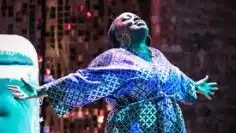THE GIFT at the Tower Theatre, Stoke Newington
Discovering Janice Okoh: A Playwright of Wit and Depth
Discovering a new talent in playwriting is always exciting. Janice Okoh is one such playwright. Her CV reveals a prolific decade-long career. She has written numerous plays, contributed to TV series, and written extensively for radio. Her third full-length play, The Gift, premiered in 2020 in Coventry and at the Theatre Royal, Stratford. The Stratford run received significant acclaim and concluded just before the COVID lockdowns. Now, The Gift arrives at Tower Theatre in Stoke Newington, showcasing Okoh’s remarkable talent.
Exploring Themes with Wit
The Gift tackles important themes with wit and classy comedy. It engages the audience more effectively than a didactic approach might. The play features sharp, well-crafted lines reminiscent of Wilde and Coward, fitting the drawing-room settings. However, the writing isn’t flawless. The tonal shifts through the three-act structure—from high social comedy to cringe comedy, and finally to a somewhat surreal conclusion—felt jarring. Set in 1862, the present day, and a hybrid of the two, the play explores British imperialism and its legacy of cultural appropriation. This theme is cleverly inverted at the outset when Yoruba princess Aina, renamed Sarah Forbes Bonetta and gifted to Queen Victoria, guides her maid Aggie through the ritual of afternoon tea. Sarah is poised and elegant, while Aggie is clumsy. Both strive to fit in with the soon-to-arrive guests. Sarah’s backstory, based on real events, unfolds more fully in Act 2.
Highlights and Satire
The highlight of the play is a modern-day Sarah, now a somewhat insecure structural engineer. She finds herself hosting a second tea party imposed by her politically correct neighbors, Harriet and Ben. They arrive with a basket of gluten-free, nut-free muffins. The dialogue in this section is finely tuned. It gradually exposes social discomfort, casual racism, and even betrayal. Harriet, in particular, delivers increasingly outrageous remarks. She considers herself a model of empathy, eliciting strong reactions from the audience. The satire here is razor-sharp and authentic, reminiscent of Harold Pinter’s “weasel under the cocktail cabinet.”
The Play’s Conclusion
Act 3 returns to the past, presenting an imagined reality where both Sarahs reflect on their societal roles. They consider the effects of trying to fit into a world that undervalues them. Okoh intriguingly reverses expectations by having the modern Sarah offer guidance to her historical counterpart. This culminates in an action that, had it occurred, would have altered history. The polemic, subtly introduced earlier, becomes more explicit, but the tonal shift felt awkward.
Cast and Direction
The cast of six excels in bringing eleven characters to life. Megan Madaleine Freeman, as Victorian Sarah, delivers a poised performance. This makes Act 3’s climax particularly shocking. Stella Betton effectively differentiates modern Sarah and Aggie, showcasing her versatility in both comedic and serious scenes. Julia Blyth enjoys her roles as the hypocritical Mrs. Waller and a robust Queen Victoria. Katie Smith stands out as the misanthropic Mrs. Schoen and the brilliantly conceived Harriet. Paulo Vieira and Henry McMenamin do well with their slightly less defined male characters, focusing on detail.
Director Landé Belo navigates the tonal transitions well and draws excellent performances from the cast. However, the repeated tea party scenes make the action somewhat sedentary. Fortunately, the sharp dialogue and compelling themes maintain audience interest. Given the current political climate, with divisive rhetoric from officials, perhaps Tower Theatre should invite the Home Secretary to this timely and thought-provoking play.
Sarah Forbes Bonetta: A Remarkable Legacy
Sarah Forbes Bonetta, a Yoruba princess and the central figure in The Gift, has a fascinating history. Queen Victoria received her as a gift, and she became a prominent figure in Victorian society. Her achievements include her education and cultural influence. She has living descendants who continue her legacy. Sarah Forbes Bonetta’s family tree is a testament to her remarkable life. She died of tuberculosis at 37, but her impact endures.














